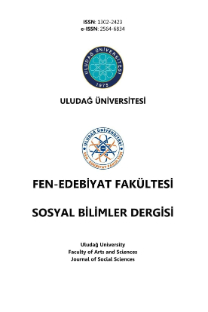1999 Marmara Depreminin Mudanya Halkı Üzerindeki Psiko-Sosyal Etkileri
Psychosocial Impacts of 1999 Marmara Earthquake on Mudanya's People
___
- Blake, D.D. Cook, J.D., & Keane, T.M. (1992). Post-traumatic stress disorder and coping in veterans who are seeking medical treatment. Journal of Clinical Psychology, 48, 695-704.
- Dağ, İ. (1990). Kontrol Odağı, Stresle Başa Çıkma Stratejileri ve Psikolojik Belirti Gösterme İlişkileri. Yayınlanmamış doktora tezi, Hacettepe Üniversitesi, Ankara, Türkiye.
- Derogatis, L.R. & Cleary, P.A. (1977). Confirmation of Dimensional Structure of the SCL-90: A Study in Construct Validation, Journal of Clinical Psychology, 33,
- Hortaçsu, N. (1989). Targets of communication during adolescence. Journal of Adolescence, 12, 253-263.
- Karancı, N.A. (1997). Erzincanlıların afet yönetimi ile ilgili değerlendirmeleri ve beklentileri. Dördüncü Ulusal Deprem Mühendisliği Konferansı, 17-19 Eylül 1997, 691-698.
- Karancı, N.A., Alkan, N., Akşit, B., Sucuoğlu, H. & Balta, E. (1999). Gender Differences in Psychological Distress, Coping, Social Support and Related Variables Following 1995 Dinar (Turkey) earthquake. North American Journal of Psychology, 1(2), 189-204.
- Karancı, N.A. & Rüstemli, A. (1995). Psychological Consequences of the 1992 Erzincan (Turkey) earthquake. Disasters, 19(1), 8-18.
- Rubanis, A.A. & Bickman, L. (1991). Psychological Impairment in the Wake of Disaster: the Disaster-Psychopathology Relationship. Psychological Bulletin, 109, 384-399.
- Rüstemli, A. & Karancı, N.A. (1999). Correlates of Earthquake Cognitions and Preparedness Behavior in a Victimized Population. The Journal of Social Psychology, 139(1), 91-101.
- Uçman, P. (1990). Ülkemizde Çalışan Kadınlarda Stresle Başa Çıkma ve Psikolojik Rahatsızlıklar. Türk Psikoloji Dergisi,7, 58-75.
- ISSN: 1302-2423
- Yayın Aralığı: 2
- Başlangıç: 1999
- Yayıncı: Bursa Uludağ Üniversitesi
Kazak Türkçesinde Şimdiki Zaman
Edebiyata Yansıyan Kriz: Sözde Kızlar ve Zaniyeler Örneği
Kariyer Planlamasında Yeni Yaklaşımlar
Bir İtalyan Arşiv Belgesine Göre Şehzade Mehmet'in Sünnet Düğünü (1582)
Miftahü'l-Fünun'un Mütercimi Meselesi
Hüdavendigâr Sahasında Konar-Göçerler
Miftahü'l-Fünun'un Mütercimi Meselesi
Gelibolulu Mustafa Âlî'nin Nusret-Nâme Adlı Eserinin Osmanlı Diplomatiği Bakımından Ehemmiyeti
Toplumsal Düzen Oluşturmaya İlişkin Üç Yaklaşım: Kant, Popper ve Sartre
Birleşik Çekimli Fiillerin Zaman ve Anlam Açısından Gösterdiği Çeşitlilikler
